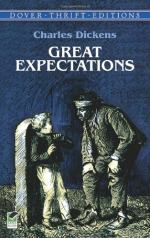This was such a singular question, that I asked him in return, “Is it so?”
“I don’t know,” said Herbert, “that’s what I want to know. Because it is decidedly the case with us. My poor sister Charlotte who was next me and died before she was fourteen, was a striking example. Little Jane is the same. In her desire to be matrimonially established, you might suppose her to have passed her short existence in the perpetual contemplation of domestic bliss. Little Alick in a frock has already made arrangements for his union with a suitable young person at Kew. And indeed, I think we are all engaged, except the baby.”
“Then you are?” said I.
“I am,” said Herbert; “but it’s a secret.”
I assured him of my keeping the secret, and begged to be favoured with further particulars. He had spoken so sensibly and feelingly of my weakness that I wanted to know something about his strength.
“May I ask the name?” I said.
“Name of Clara,” said Herbert.
“Live in London?”
“Yes. Perhaps I ought to mention,” said Herbert, who had become curiously crestfallen and meek, since we entered on the interesting theme, “that she is rather below my mother’s nonsensical family notions. Her father had to do with the victualling of passenger-ships. I think he was a species of purser.”
“What is he now?” said I.
“He’s an invalid now,” replied Herbert.
“Living on — ?”
“On the first floor,” said Herbert. Which was not at all what I meant, for I had intended my question to apply to his means. “I have never seen him, for he has always kept his room overhead, since I have known Clara. But I have heard him constantly. He makes tremendous rows — roars, and pegs at the floor with some frightful instrument.” In looking at me and then laughing heartily, Herbert for the time recovered his usual lively manner.
“Don’t you expect to see him?” said I.
“Oh yes, I constantly expect to see him,” returned Herbert, “because I never hear him, without expecting him to come tumbling through the ceiling. But I don’t know how long the rafters may hold.”
When he had once more laughed heartily, he became meek again, and told me that the moment he began to realize Capital, it was his intention to marry this young lady. He added as a self-evident proposition, engendering low spirits, “But you can’t marry, you know, while you’re looking about you.”
As we contemplated the fire, and as I thought what a difficult vision to realize this same Capital sometimes was, I put my hands in my pockets. A folded piece of paper in one of them attracting my attention, I opened it and found it to be the playbill I had received from Joe, relative to the celebrated provincial amateur of Roscian renown. “And bless my heart,” I involuntarily added aloud, “it’s to-night!”




